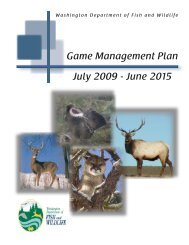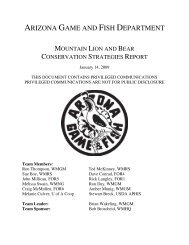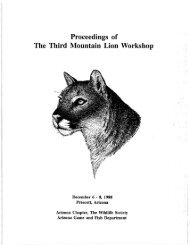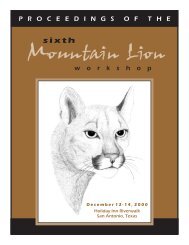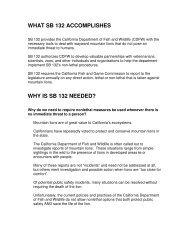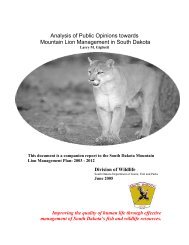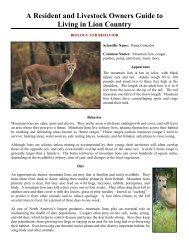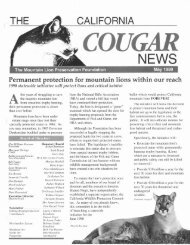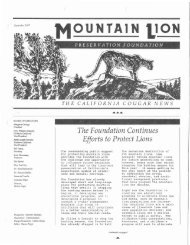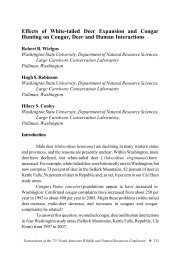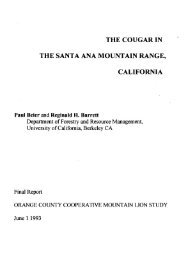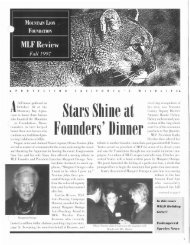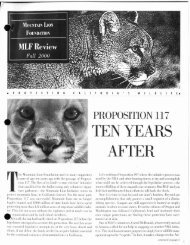Proceedings of the Ninth Mountain Lion Workshop - Carnivore ...
Proceedings of the Ninth Mountain Lion Workshop - Carnivore ...
Proceedings of the Ninth Mountain Lion Workshop - Carnivore ...
You also want an ePaper? Increase the reach of your titles
YUMPU automatically turns print PDFs into web optimized ePapers that Google loves.
eviewed scientific information, and public influence were used in development <strong>of</strong><br />
management plans. Considering <strong>the</strong>se points, it could be argued that updating<br />
management plans every 7-10 years or more may not effectively incorporate <strong>the</strong>se<br />
dynamic factors. In fact, 2 common criticisms agencies received regarding management<br />
plans were that inadequate science was being used and public opinion was not being<br />
addressed (Table 13). It should also be noted that, in some cases, legislation could force<br />
social and political influence into <strong>the</strong> biological arena <strong>of</strong> cougar management; in<br />
Washington, 16 legislative bills regarding cougar management have been introduced<br />
since 1996 (Washington State Legislature, 2008). Overall, resolving <strong>the</strong>se limitations<br />
will likely take various approaches. For using science to develop in management plan,<br />
we recommend agencies conduct field research in <strong>the</strong>ir jurisdictions. Despite <strong>the</strong> obvious<br />
financial commitments, well-designed field research provides <strong>the</strong> best method for<br />
evaluating cougar population. For assessing public opinion, agencies may want to refine<br />
<strong>the</strong>ir survey protocols. Typically, agencies survey <strong>the</strong>ir public at periodic meetings with<br />
a limited audience; a more balanced and representative approach may be to use a randomsampling<br />
technique to assess public opinion. This would allow agencies to understand<br />
public perceptions jurisdiction-wide and also ga<strong>the</strong>r information to create effective<br />
outreach methodologies.<br />
Table 13. Public comments and criticisms commonly received by agencies regarding cougar<br />
management plans, by jurisdiction, as reported in a survey <strong>of</strong> North American wildlife agencies, 2008.<br />
Jurisdiction Comments /Criticism Commonly Received Regarding <strong>the</strong> Cougar Management<br />
Plan<br />
Alberta The plan needs updating with information from current research and knowledge.<br />
Arizona No response provided. No Management Plan<br />
California Sportsmen want to hunt lions in CA, and law prohibits that. The public wants problem<br />
lions moved, but our policy generally prohibits translocation.<br />
Colorado We have 19 discrete Data Analysis Unit plans. Some interests complained that it<br />
meant commenting on each and trying to get <strong>the</strong>ir staff to each meeting in many<br />
different parts <strong>of</strong> <strong>the</strong> State. O<strong>the</strong>r interests feel our biological parameters were too<br />
restrictive. We made <strong>the</strong>m that way in order to operate under conservative or<br />
moderate assumptions given lack <strong>of</strong> information on <strong>the</strong> species. But generally, both<br />
interests accept <strong>the</strong> plans.<br />
Florida N/A, No Management Plan<br />
Idaho That <strong>the</strong> management plan relies on age structure without knowing what <strong>the</strong> data really<br />
mean.<br />
Montana N/A, No Management Plan<br />
Nevada We hunt too much or not enough. (see-saw aspect <strong>of</strong> anti-hunting vs. pro sportsmen<br />
groups). We get criticism for not harvesting more lions.<br />
New Mexico We don't have enough research into <strong>the</strong> actual population estimates <strong>of</strong> cougars and we<br />
rely upon estimates to make management decisions<br />
Oregon General opposition to <strong>the</strong> plan, inadequate science, insufficient data for decisionmaking,<br />
dislike for active management, desire for more preservation/conservation,<br />
desire for more aggressive management, general support for <strong>the</strong> plan.<br />
South Dakota We constantly receive comments that our plan does not produce "raw data" collected<br />
from ongoing research and surveys conducted by <strong>the</strong> Department.<br />
Texas N/A, No Management Plan<br />
Utah Too liberal, too conservative<br />
Washington Not enough science being used. Frustration with legislation. Input into plans was<br />
limited.<br />
Wyoming No response provided<br />
<strong>Proceedings</strong> <strong>of</strong> <strong>the</strong> <strong>Ninth</strong> <strong>Mountain</strong> <strong>Lion</strong> <strong>Workshop</strong><br />
226



